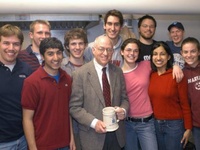“I discovered I really did like economics,” he says. “I was attracted to the fact that economics provided answers to important questions—it wasn’t just speculation.”
After earning his doctorate in economics at Oxford, Feldstein crossed the Atlantic to assume a professorship at Harvard while he was still in his late twenties.
Feldstein says that he initially decided to become a teacher because of the freedom it offered.
“The main thing that I found attractive is that a professor decides what he wants to work on,” he says. “Unlike working at a business or for the Federal Reserve or in the government...as an academic, you can pick what you find interesting.”
At Harvard, Feldstein’s name has become synonymous with the flagship Harvard course he has taught for 21 years: Social Analysis 10, “Principles of Economics.”
But this year marks a major milestone for Feldstein. Last month, he announced that he would turn over the reins of Ec10 to Freed Professor of Economics N. Gregory Mankiw.
Feldstein seems bittersweet about his departure from Ec10, which he calls a “very important part of my life.”
“It has been a great privilege teaching Ec10,” he says. “I will miss Ec10.”
He estimates that during his 21 years at the helm, more than 15,000 students have flocked to Sanders Theatre to hear Feldstein lecture on financial markets, aggregate demand, and macroeconomic growth.
Former doctorate student Jonah Rockoff says Feldstein’s popularity is a result of the personal connections he forms with his students.
“I think what’s really particularly great about Marty is that...when he sits down with you, you always are made to feel like there’s nothing else on his schedule and all he wants to do is talk and help you with your work,” says Rockoff, now an associate professor at Columbia Business School.
INFLUENCE
The author of more than 300 papers on economics and a mentor to hundreds of budding Harvard economists, Feldstein has maintained a significant influence on U.S. economic policy.
Winner of the John Bates Clark Medal of the American Economic Association in 1977—which, along with the Nobel Prize, is considered the most prestigious award in economics—he is most famous for his research on taxes and government spending and the way in which policy influences consumer behavior. His name frequently appears on the op-ed pages of major publications, and many say he is a driving force in persuading the public to back President Bush’s tax cuts.
Feldstein has served as president and CEO of NBER—a consortium of more than 500 economists—since 1984. NBER’s power comes from its reputation as a forum for top-notch researchers, who often turn to NBER first to publish their works.
Read more in News
Sigma Chi Frat Still Homeless After Failed Bid













